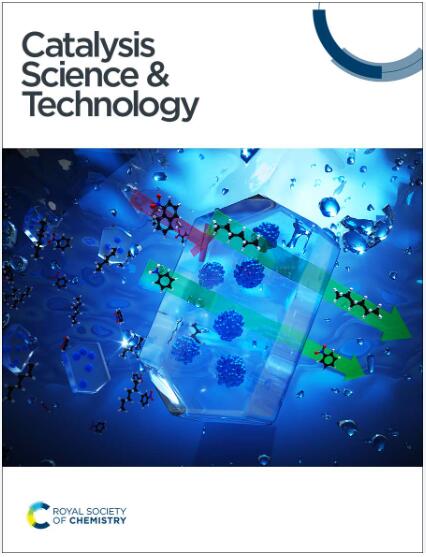以叶状硅酸铜为催化剂,在富硅醇WO3催化剂上交叉复分解制备生物衍生丁二烯
IF 4.4
3区 化学
Q2 CHEMISTRY, PHYSICAL
引用次数: 0
摘要
生物丁二烯是由生物乙醇衍生的乙炔/乙烯在负载WO3上在富含硅醇的二氧化硅上进行交叉复分解制备的。20CuPS和30CuPS在酸性溶液(1 M HCl)下进行cu浸出前的初步还原。与气相SiO2相比,29Si CPMAS NMR表明,通过去除包裹在CuPS四面体二氧化硅层内的Cu2+八面体位点(Cu2+(OSi)6),表面硅烷醇的含量增加,特别是分离的硅烷醇(Q3)。气相SiO2、20CuPS-Le和30CuPS-Le中的表面硅醇充分容纳单位点和聚合物WO3,在5 wt%负载下产生相似的1,3-丁二烯收率(~ 4.7 mmol h - 1 gcat)。只有30CuPS-Le足以提供暴露的硅烷醇来分散8wt %的WO3负载,而不会大量形成WO3。交叉分解活性取决于暴露的硅烷醇的相对量。因此,稳定的1,3-丁二烯产量为8wo3 / 30cup - le (6.3 mmol h−1 gcat) >;8WO3/20CuPS-Le (5.1 mmol h−1 gcat) >;8WO3/SiO2 (2.5 mmol h−1 gcat)。本文章由计算机程序翻译,如有差异,请以英文原文为准。
Bio-derived butadiene from cross-metathesis over silanol rich WO3 catalysts obtained from copper phyllosilicate†
Bio-butadiene can be produced from cross-metathesis of bioethanol-derived acetylene/ethylene over supported WO3 on silanol-rich silica prepared with Cu-leached copper phyllosilicate (CuPS). 20CuPS and 30CuPS were preliminarily reduced before Cu-leaching under an acidic solution (1 M HCl). Compared with fumed SiO2, 29Si CPMAS NMR spectroscopy showed an increase in surface silanols, particularly the isolated silanols (Q3), from removing Cu2+ octahedral sites (Cu2+(OSi)6) encapsulated within tetrahedral silica layers of CuPS. The surface silanols in fumed SiO2, 20CuPS-Le, and 30CuPS-Le adequately accommodate single-site and polymeric WO3 species, leading to a similar 1,3-butadiene production rate (∼4.7 mmol h−1 gcat) at 5 wt% loading. Only 30CuPS-Le sufficiently provides the exposed silanols to disperse 8 wt% WO3 loading without bulk WO3 formation. The cross-metathesis activity depends on the relative amounts of exposed silanols. Accordingly, the steady 1,3-butadiene production was obtained in the order of 8WO3/30CuPS-Le (6.3 mmol h−1 gcat) > 8WO3/20CuPS-Le (5.1 mmol h−1 gcat) > 8WO3/SiO2 (2.5 mmol h−1 gcat).
求助全文
通过发布文献求助,成功后即可免费获取论文全文。
去求助
来源期刊

Catalysis Science & Technology
CHEMISTRY, PHYSICAL-
CiteScore
8.70
自引率
6.00%
发文量
587
审稿时长
1.5 months
期刊介绍:
A multidisciplinary journal focusing on cutting edge research across all fundamental science and technological aspects of catalysis.
Editor-in-chief: Bert Weckhuysen
Impact factor: 5.0
Time to first decision (peer reviewed only): 31 days
 求助内容:
求助内容: 应助结果提醒方式:
应助结果提醒方式:


